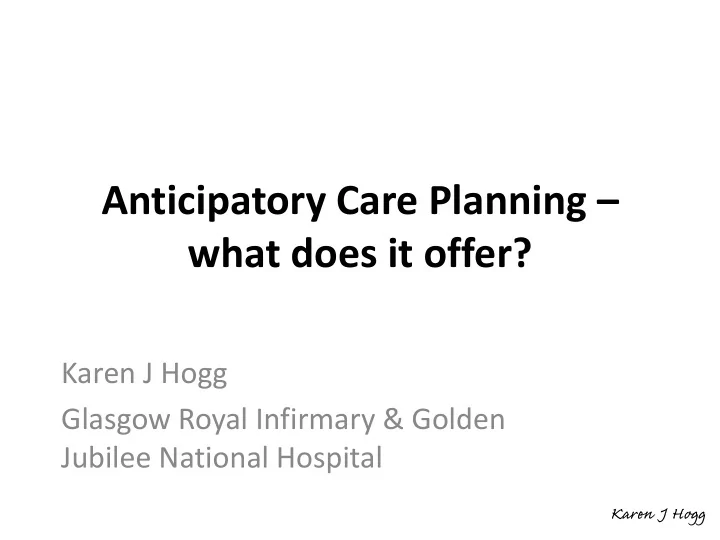

Anticipatory Care Planning – what does it offer? Karen J Hogg Glasgow Royal Infirmary & Golden Jubilee National Hospital Karen J Hogg
What is anticipatory care planning? • Process designed to support patients living with a chronic long-term condition to help plan for an expected change at some time in the future • Voluntary progressive process of discussion – Patient at a time where they have capacity to make healthcare decisions, family, and healthcare providers • Patient held and led document – Prompt patients and clinicians to “think ahead” – Details patients’ current & future priorities of care • Not legally binding – Can result in legal documentation • DNACPR • Wills • Power of attorney
Illness trajectory associated with cancer Time to plan Cancer Good Increased need for palliative care services Functional status Poor Death Onset of incurable cancer Time Adapted from Murray, S. A et al. BMJ 2005;330:1007-1011
Unpredictable HF illness trajectory & “prognostic paralysis” Good “The physician who can foretell the course of the illness is the most highly esteemed” Heart Failure Hippocrates Functional status Intervention: CRT D Death D D Poor Time D = clinical decompensation Sudden cardiac death Adapted from Murray, S. A et al. BMJ 2005;330:1007-1011
What is needed for Medical Anticipatory Care Plan? • Time – Explanation and discussion • Communication skills – Some discussions can be or can become complex • Support to follow up on difficult conversations • Aware that these discussions can raise other issues not necessarily directly related to that patient or the issues being discussed • Communication of MACP – Efficiently to other HCPs involved in care in 1 o and 2 o care – Electronic systems – Out of hours
Who should complete the Medical Anticipatory Care Plan? • Healthcare professional – Relationship with the patient to facilitate the appropriate conversations – Who knows most about their condition • May need to involve others where there are multiple co-morbidities or specific circumstances
Medical Anticipatory Care plans match preferred place of care & reduce hospital admissions Medical ACP No Medical ACP K Hogg & SMM Jenkins Medical Anticipatory Care Plans prevent hospital admissions European Heart Journal (2012) 33 (Abstract supplement) 483-484
Medical Anticipatory Care Plan in Practice • 70yr old male – Chronic heart failure with severe LVSD ( QRSd 118ms ) – Secondary prevention ICD – Multiple co-morbidities ( DM, Arthritis, COPD, CKD, AF, anaemia ) • 5 Admissions over 6 months various reasons (86 bed days) – Pulmonary oedema & ascites – Painful cellulitic legs 2 o peripheral oedema – Appropriate discharge from defibrillator – Acute on chronic renal impairment – Falls secondary to postural hypotension
Spoke with patient established priorities of care • Preferred place of care – Home • Did not want any further hospital admission Symptom Management Medical Rx ICD • Improved diuresis with bumetanide • Reprogrammed • Rationalised • Reduction in gut oedema + prokinetic • Established his • Switched improved nausea and appetite thoughts regarding high dose • Breathlessness improved with previous discharges oral diuretics oxynorm which also improved pain from his ICD (bumetanide) control from arthritis • Aqueous cream + menthol & oral balance gel for dry skin and mouth HOME FU: HF&SC clinic HFLN service at home Day services local hospice with his wife Medical Anticipatory Care plan
Outcome • 4 months following discharge from hospital – Primarily home care with help of GP/DN and HFLN service guided by medical ACP – Attended HF&SC clinic at GRI • Optimised heart failure medication • Managed cardiac & non-cardiac symptoms • Ongoing discussions re timing of device deactivation • Made alterations to MACP – Attended and benefited from day services at local hospice – No hospital admissions – No discharges from ICD
Outcome • 5 months following discharge from hospital – Losing weight & developing cahexia – Increasing symptom burden – Spending more time in bed – ICD was deactivated electively as planned – Developed resistant painful ascites despite high dose oral diuretics – Short admission to local hospice to allow for some ascitic fluid to be drained to relieve symptoms
Outcome • 6.5 months following discharge from hospital (Hospital bed days = 0) – Died comfortably at home with family supported by HFLN service, community palliative care and GP – No further hospital admissions – No further discharges from device – Death was not a surprise and the family felt supported – GP provided bereavement care – Wife continued to attend local hospice for support for several months following his death Karen J Hogg
Recommend
More recommend